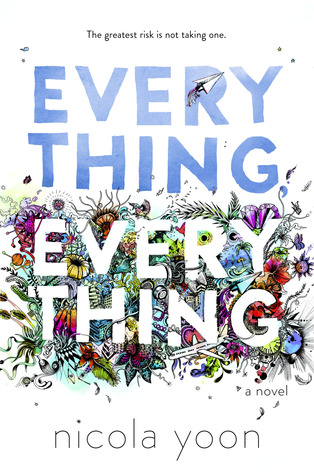
 Author: Nicola Yoon
Author: Nicola YoonPublish Date: 1 September 2015
Genre: Realism, romance
Audience: Young adult
'Madeline Whittier is allergic to the outside world. So allergic, in fact, that she has never left the house in all of her seventeen years. But when Olly moves in next door, and wants to talk to Maddy, tiny holes start to appear in the protective bubble her mother has built around her. Olly writes his IM address on a piece of paper, shows it at her window, and suddenly, a door opens. Maddy is certainly going to fall in love with Olly. It's almost certainly going to be a disaster.'
I had heard numerous good reviews about 'Everything Everything', and since it was mentioned on the first Zoella Book Club list I've been extremely eager to read it. My friend Bex kindly gave me her copy which she was going to donate, and once I'd got my hands on it I was itching to delve in.
Unfortunately for me, this book was a huge disappointment. Firstly, I read it in two days, but not because it was gripping or moreish; to put it simply, I just wanted to get it over with! I wasn't interested by the vast majority of the actual text in the book, with a lot of sentences seeming unnecessary to the plot and easy to skip over. I am normally a fan of short and disjunct writing, but in this instance it just made the novel much more tedious.
In addition, I didn't feel emotional attachment to a single character. Some characters, such as Madeline's nurse Carla, had potential, but there was simply not enough interaction or background information to feel connected to them - and this is a book where you really have to feel connected. The protagonist Madeline became increasingly irritable as the plot progressed, as her and Olly's dialogue remained the same, pretentious reflections that are so overused in young adult fiction.
I liked the premises of the plot, but not a single element was padded out sufficiently. The illness Madeline suffers from was barely explained despite being the focal point of the story, and the action was too fast-paced to be believed. Think your typical 'boy meets girl - they run away'. The 'dramatic' plot twist and the cliché ending were entirely predictable, and one which simply made me roll my eyes in annoyance.
Believe it or not, there were some aspects which I liked about 'Everything Everything'. The pages of diagrams added a fresh break from the mundane writing, even if they did quicken the already fast-moving story. The drama between Olly and his father was well-described, and it was possibly the one thing in the novel which had me wanting to know more. As a sucker for chaos theory, I loved the brief addition of that at the end, but I do wish it would have played a bigger part from the beginning.
In conclusion, 'Everything Everything' was a very disappointing read from start to finish. The characters were lack-lustre, and the plot was incredibly predictable and cliché; everything felt like it held potential, but nothing was ever fully explored. If I've learnt one thing from this book it would be - don't always believe the hype!


































